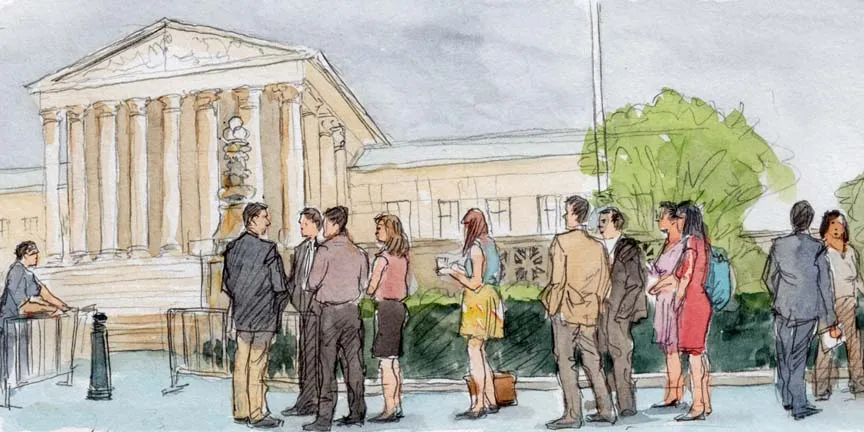Wednesday round-up

on Oct 3, 2018 at 6:48 am

This morning the justices will hear the last two oral arguments of the week. First on the agenda is Knick v. Township of Scott, Pennsylvania, which asks whether the court should reconsider a precedent that requires property owners to exhaust state remedies before bringing federal takings claims under the Constitution. Miriam Seifter previewed the argument for this blog. Isaac Syed and Yuexin Angela Zhu have a preview at Cornell Law School’s Legal Information Institute, and Subscript Law provides a graphic explainer for the case. Today’s second argument is in New Prime Inc. v. Oliveira, which involves the scope of an exemption in the Federal Arbitration Act for transportation workers involved in interstate commerce. Ronald Mann had this blog’s preview, and Lauren Kloss and Nayanthika Ramakrishnan preview the case for Cornell.
Yesterday the justices considered Madison v. Alabama, an Eighth Amendment challenge to the execution of a death-row inmate who has dementia and cannot remember his crime. Amy Howe has this blog’s argument analysis, which first appeared at Howe on the Court. Nina Totenberg reports for NPR that Madison’s lawyer “told the justices that executing a man so incompetent is unconstitutionally cruel and unusual punishment.” For The New York Times, Adam Liptak reports that several “justices appeared to be looking for a way to rule for the inmate, Vernon Madison, without making a broad statement.” Additional coverage comes from Robert Barnes for The Washington Post, Andrew Chung at Reuters, and Richard Wolf at USA Today. Yesterday’s second case was Gundy v. United States, which asks whether a provision of the federal sex-offender act violates the nondelegation doctrine. For The Wall Street Journal, Jess Bravin reports that several “justices appeared skeptical of a sex-offender’s challenge to a federal law giving the U.S. attorney general retroactive authority to decide which such criminals must register with authorities after they get out of prison.”
At NPR, Nina Totenberg reports that in Weyerhaeuser Company v. U.S. Fish and Wildlife Service, a challenge to the federal government’s critical-habitat designation for the dusky gopher frog that was argued on Monday, “the four liberal justices pointed to language in the Endangered Species Act that allows reasonable actions like this one, and the court’s four conservatives complained that the Fish and Wildlife Service doesn’t say what reasonable is.” At PrawfsBlawg, Roderick Hills observes that “[t]he advantage of the narrower, crisper reading of ‘habitat’” advocated by Weyerhaeuser “is that it not only removes [a] cloud on land titles but also places some judicially manageable limits on the FWS’s jurisdiction.” Additional commentary comes from Mark Miller at the Pacific Legal Foundation Blog.
Charlotte Garden has this blog’s analysis of Monday’s oral argument in Mount Lemmon Fire District v. Guido, which asks whether the 20-employee minimum in the Age Discrimination in Employment Act applies to state and local governments.
For The National Law Journal (subscription or registration required), Tony Mauro reports that “[i]n the wake of Supreme Court nominee Brett Kavanaugh’s angry testimony before the Senate Judiciary Committee last week, some commentators are predicting that if confirmed, he may face calls for recusal in a range of cases,” and lists “four categories of cases that have been mentioned as recusal triggers for Kavanaugh,” concluding that recusal is “unlikely” in many cases. At CNN, Joan Biskupic writes that “[i]t is reasonable to anticipate the possibility of another series of 4-4 deadlocks on national legal controversies” on an eight-member court.
Briefly:
- In an op-ed for The National Law Journal (subscription or registration required), Arthur Bryant observes that “[m]illions of consumers and employees cannot hold corporations that cheated or injured them accountable because the court recently changed the law and held that federal pre-emption, arbitration clauses and class action bans eliminated their rights to a day in court and a jury trial,” and highlights “[f]our cases now pending ask the court to immunize corporations even more.”
We rely on our readers to send us links for our round-up. If you have or know of a recent (published in the last two or three days) article, post, podcast, or op-ed relating to the Supreme Court that you’d like us to consider for inclusion in the round-up, please send it to roundup [at] scotusblog.com. Thank you!


